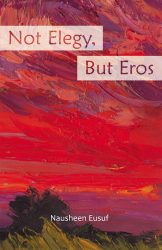Poetry Review: “Not Elegy, But Eros” — A Skilled New Voice
Nausheen Eusuf’s deep affection for language and sound is omnipresent.
Not Elegy, But Eros by Nausheen Eusuf. NYQ Books (US) and Bengal Lights Books (Bangladesh), 88 pages, $14.91.
By Ed Meek

Nausheen Eusuf’s first book of verse is a wide-ranging collection of both formal and informal poems, lyric and narrative. Quite a few are elegies for the dead, others are about everything from dogs to street people, language, and violence in Bangladesh (where she grew up). Robert Bly, quoting Hammurabi, said “For whom dost thou write? For the dead whom thou didst love.” Eusuf seems to subscribe to this notion inasmuch as many of her poems are about family and relations who have passed on, and also because she refers to the many poets who preceded her. Among them: Auden, Dickinson, Eliot, Thomas, Hayden. She pays homage and that is always an admirable trait in an artist. In addition, her love of words is displayed in her skillful use of language.
The sorrows of the dead
refuse to perish with their mortal masters.
The griefs they grieved, the slights they bore,
how can they not, once told, return to task
the living—a collector at the door?
So Eusuf is a poet who sees poetry as song. And, like the rest of us, she doesn’t forget those who have passed on—a role poetry has performed for as long as it has existed. You can hear Eusuf’s love of song in “Street Music.”
Saturday morning on the brick plaza
at the corner of Fourth and Catherine,
amid the strollers and shopping bags,
the coffee and the canopied coffee talk,
a man in a tie-dyed African shirt
sways to the music of the marimba.
It’s refreshing when a poet has the humility to observe and record without editorializing.
As a new dog-owner I appreciated Eusuf’s “The Love of Dogs.”
Of leash-tugging, hydrant-scenting walks
past grown-ups with baby strollers and kids
who stop to say, how cute! But he’s more
than a pair of floppy ears and a pink tongue.
Eusuf’s deep affection for language and sound is omnipresent. Here is the beginning of one about a crab colony in Yarmouth:
How cautiously they emerge as the tide recedes:
a mud-boil pops, out pokes a tentative claw,
a pair of skinny legs, half a glistening carapace…
“Shining Shoes” is a take-off on one of my favorite poems, Hayden’s “Those Winter Sundays”
Weekends, growing up, I’d watch my father
As he sat on a low stool in the veranda
Surrounded by half a dozen pairs of shoes…
Now that he is ten years gone, I recall how
quiet was his love, how mute his farewell.
Eusuf is also like many of us, obsessed with the light. In “The Analytic Hour,” she asks for more of it:
The diaphanous curtains hung between
the light and me—I who see
but do not see. More light, for god’s sake,
more light. Let there be light.
That’s nice—”I who see but do not see.” And who doesn’t love the word diaphanous? Although I’m not sure any human can get away with saying “Let there be light.”
What should be a rule for poets: exhibit skill. Instead, a lot of what we see and read just happens to capture the current moment, whether it’s “Cat Woman” in The New Yorker or a poem about penises, written in sophomoric couplets in Rattle. The bar isn’t just low — there isn’t any bar. It isn’t playing tennis without a net; it’s paddle ball on the beach. So it’s refreshing to find Eusuf (who is currently a PhD candidate in English at Boston University), a new voice who brings craft, intelligence, and a passion for language to bear on both the personal and the political in Not Elegy, But Eros.
Ed Meek is the author of Spy Pond and What We Love. A collection of his short stories, Luck, came out in May. WBUR’s Cognoscenti featured his poems during poetry month this year.
